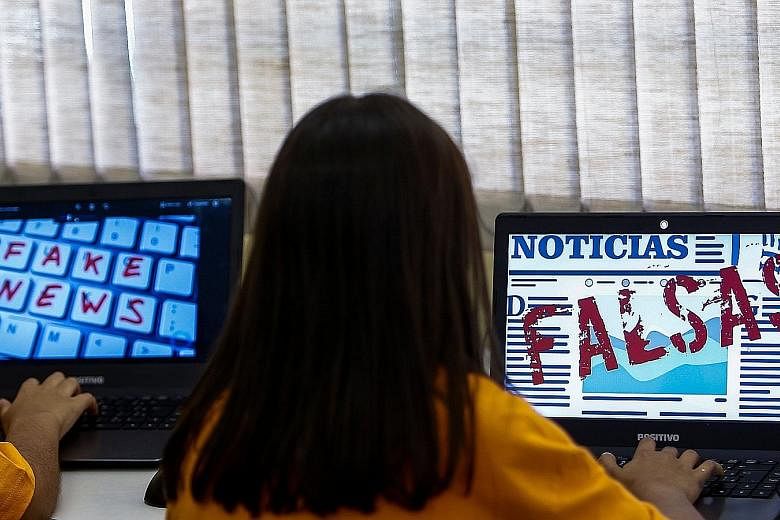SAO PAULO • Brazil has taken a stand against the explosion of "fake news" stories swamping the Internet by making media analysis studies compulsory for schoolchildren.
"The aim is to teach students to identify fake news, and now it's part of the national curriculum because the country has decided it's necessary," said Mr Leandro Beguoci, editorial director at Brazilian education specialists Nova Escola.
"The proliferation of social media networks has created an urgent situation in this respect," he added.
Media analysis studies became compulsory last December, but have for years now been offered alongside traditional subjects such as mathematics and history in some Brazilian schools.
Kayo Rodrigues, 14, said the Brazilian press is not perfect, but plays a vital role in combating fake news "because not everyone has the Internet or the tools to check facts". She enrolled in the "Young Press" programme launched six years ago in the Casa Blanca public school in Sao Paulo.
At Casa Blanca, teachers Lucilene Varandas and Hildenor Gomes do Santos ensure their students, aged eight to 14, know not to take everything they watch or read at face value.
-
BRAZIL'S MASSIVE SOCIAL MEDIA PRESENCE
-
120m - Number of WhatsApp users
>100m - Number of people on Facebook
50m - Number signed up to Instagram
"When I receive a piece of information, I look for it on the Internet and ask myself if it's true," said Helena Vital, 11, whose parents are teachers. She said the programme has taught her to view the media from a different perspective.
"Now I know that things aren't so bad, the whole country isn't going to collapse," added Vital, who said that consuming news without questioning it "leaves people sad".
The children do not have the tools to systematically check everything, but "they look at the articles, who wrote them, who could be interested in them and where they're published, which are all ways of questioning the information", said Ms Varandas, who is looking to create partnerships with fact-checking agencies to expand the children's education.
The measures seem to be working despite the children's young age. "All it takes is one click to share false news; this project teaches me to think about my clicks," said Rodrigues, daughter of a shopkeeper and a manicurist.
-
Laws to counter false information
-
How some countries are bringing in legislation to fight fake news:
Germany: The Parliament adopted in June last year a law against the posting on social media of hate speech, child pornography, terror-related items and false information. Social media platforms like Facebook can be punished with fines of up to €50 million (S$80 million) if they fail to remove such illegal content.
France: Two controversial draft laws are under discussion in its Parliament aimed at guarding against "the manipulation of information" during an electoral period.
The legislation would enable a candidate or political party to ask the courts to order an immediate halt to the publication of information deemed to be false in the three months leading up to a national election.
Malaysia: Its Parliament in April approved a law punishing the propagation of partially or totally false information with jail of up to six years and fines of RM500,000 (S$170,000). It was slammed as an attempt to silence criticism of the then government. New Prime Minister Mahathir Mohamad has said the legislation will be repealed when Parliament reconvenes this month.
Kenya: President Uhuru Kenyatta signed into law in May a cyber-crimes Act that criminalises online bullying but also aims to stop the spread of fake news. One clause targets the publication of "false, misleading or fictitious data", providing punishment of US$50,000 (S$68,400) or up to two years in prison, or both.
AGENCE FRANCE-PRESSE
With a population of almost 208 million people, Brazil has a massive social media presence: 120 million WhatsApp users, over 100 million people on Facebook and another 50 million signed up to Instagram.
No fewer than 14 draft laws related to "fake news" are under examination in Brazil's Parliament, with disinformation a looming battleground in the highly connected country ahead of contested presidential elections in October.
Ten of Brazil's 35 political parties last month signed a deal with the election authority to fight "the dissemination of false information".
"What's so interesting in Brazil is that media and technological literacy is considered as important as classical literacy," said Mr Beguoci, a journalist by training.
For Ms Veronica Martins Cannata, who coordinates technology and communication studies at the private Dante Alighieri school, children have their own responsibility when it comes to fake news.
"As natives of the digital age, children and teenagers must take the responsibility to analyse that content before reproducing it," she said.
AGENCE FRANCE-PRESSE

